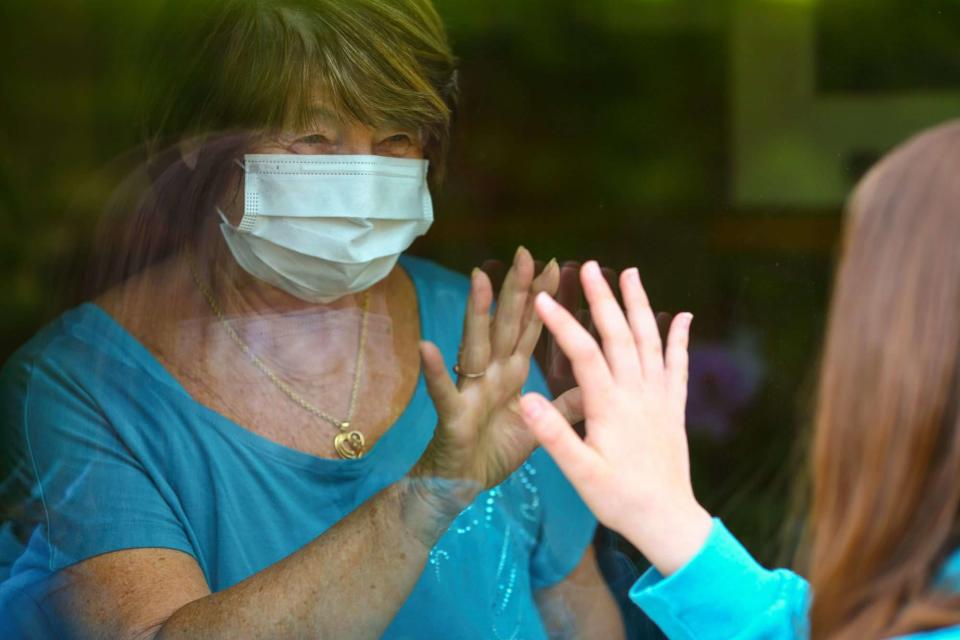Is It Safe to See Family After Getting the COVID-19 Vaccine?
- Oops!Something went wrong.Please try again later.
With COVID-19 cases declining across the country, and three vaccines that effectively protect against serious illness, Americans have been letting down their guards. Family reunions are back on the calendar, and grandparents have been enjoying time with their grandchildren. But it's important to note that gatherings aren't completely free of danger, especially with reports of breakthrough cases and transmissible variants. Keep reading for some important things to consider before seeing family members—especially those who are older or immunocompromised.
The Latest CDC Guidelines
In America, three COVID-19 vaccines are currently being distributed: Pfizer, Moderna, and Johnson & Johnson. The best way to protect your family members is staying up-to-date on COVID-19 vaccinations. The Centers for Disease Control and Prevention (CDC) recommends that everyone ages 6 months and older complete their primary vaccine series; certain individuals should also get booster shots.
The CDC has introduced COVID-19 Community Levels, which can help guide decisions when meeting with others. These community levels assess data on recent infections and hospitalizations in all American counties. Each county is assigned a low, medium, or high classification—and recommended prevention steps vary based on these classifications.
Planning a visit with family members? Check your location's COVID community level using this chart, then follow the recommended guidelines from the CDC.
Low Community Level: You don't need to wear a mask indoors, but it's up to personal preference. "You might choose to wear a mask regardless of the level of transmission if you have a weakened immune system or if, because of your age or an underlying medical condition, you are at increased risk for severe disease, or if a member of your household has a weakened immune system, is at increased risk for severe disease, or is unvaccinated," according to the CDC.
Medium Community Level: If you're immunocompromised or high risk, talk to your health care provider about wearing a mask. Consider testing and masking if you're visiting a high-risk individual.
High Community Level: Everyone over age 2 should wear a mask in public indoor spaces (including K-12 schools).
Important Considerations for Visiting Family Members
If everyone in your family is vaccinated, you might think it's safe to host gatherings and parties. And while the CDC agrees that most people don't need to wear masks or social distance now, there's still so much about COVID we're uncertain about, says Jeannie Kenkare, D.O., FAAFP, chief medical officer of PhysicianOne Urgent Care. We spoke with experts about important factors to consider before visiting family members.
The vaccine is highly effective, but it's not foolproof.
All available vaccines are highly effective at preventing hospitalization and death from COVID-19. That said, breakthrough cases are possible as immunity wanes over time, especially as contagious new variants emerge. And while most breakthrough cases are mild or asymptotic, severe illness can happen on rare occasions.
What's more, people who are vaccinated but take a medication that may weaken their immune system, or those who have an underlying medical condition, may not be fully protected if vaccinated and boosted, according to the CDC.
Make sure to keep these facts in mind when mulling over questions like "Can I hug my grandchildren after the vaccine?" or "Can I visit my grandparents?" You simply don't know whether your relatives will still be susceptible to COVID-19 after vaccination.
Vaccine immunity decreases over time.
At this stage, experts are researching how long you're immune to COVID-19 after receiving the vaccine, says Rosemary Olivero, M.D., head of the pediatric infectious disease program at Helen DeVos Children's Hospital. They've found that effectiveness does tend to decrease over time, especially when it comes to contagious new variants like Omicron. That's why U.S. health officials are recommending booster shots five months after vaccination with Pfizer and Moderna, and two months after vaccination with Johnson & Johnson. A second booster shot is also available to certain people.

Getty Images.
Experts don't know whether people can still spread COVID-19 after getting vaccinated.
The vaccines are designed to protect vaccinated individuals from getting sick. Clinical trials didn't test whether they could still spread SARS-CoV2, the virus that causes COVID-19, says Dr. Olivero. Vaccines usually prevent transmission, and while data indicates the COVID-19 vaccine might do the same, experts still aren't 100 percent sure of the specifics. Indeed, the Delta and Omicron variants are still transmitted by vaccinated individuals.
Why is this important for families? There are no vaccines currently available for children under the age of 6 months. "Although children have not been shown to get as sick from COVID-19, it is still possible for them to catch the virus and unknowingly spread it," says Sandra Adams, Ph.D., virologist and Professor of Biology at Montclair State University. In other words, your kids could possibly contract the coronavirus from vaccinated family members, although the risk is decreased.
The Bottom Line
Given the CDC's guidelines, it's probably safe for vaccinated people to visit (and hug!) their family members. Keep up to date on COVID-19 data trends and take recommended precautions.

